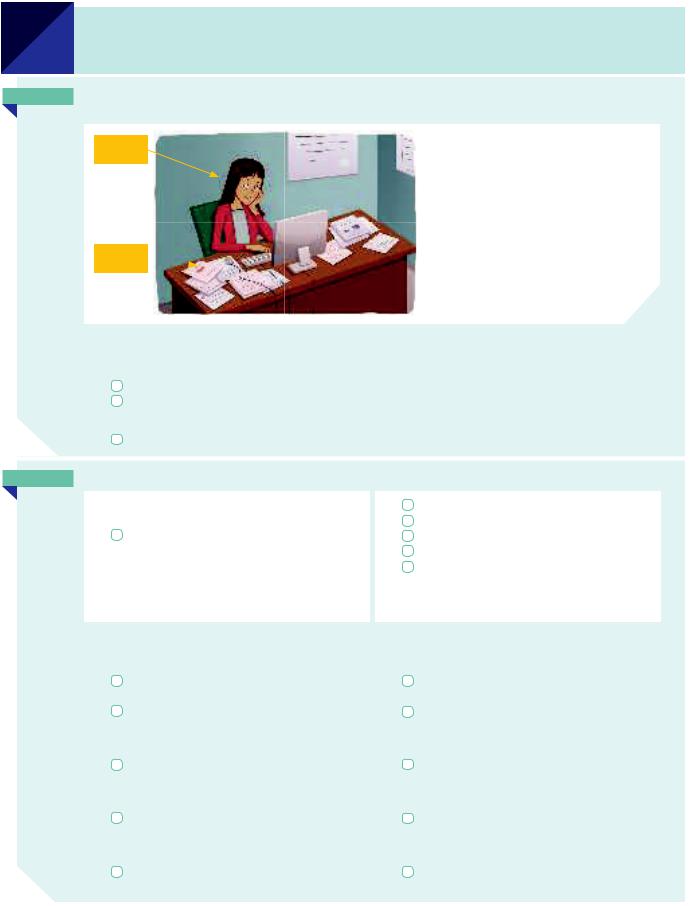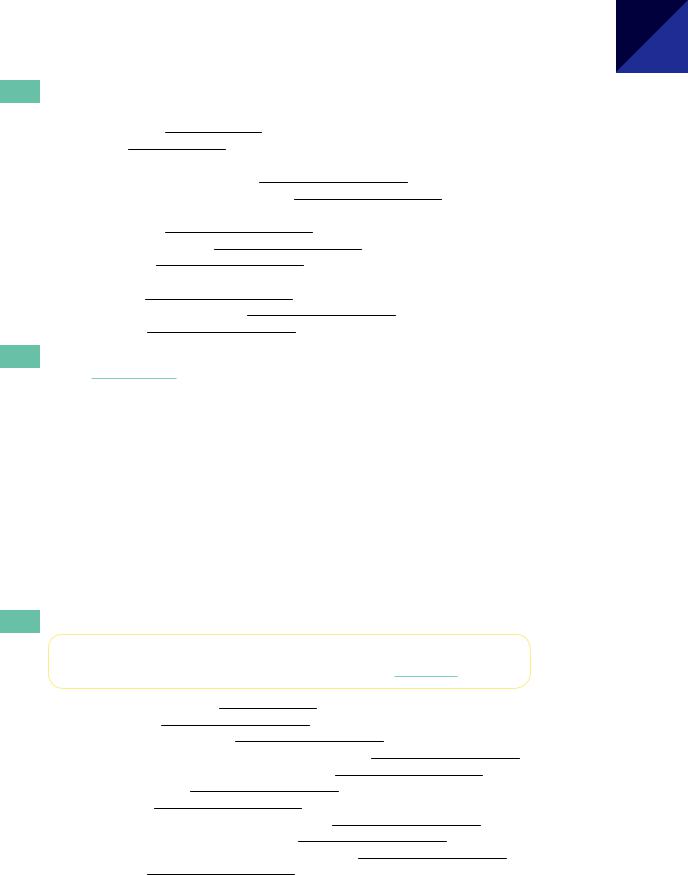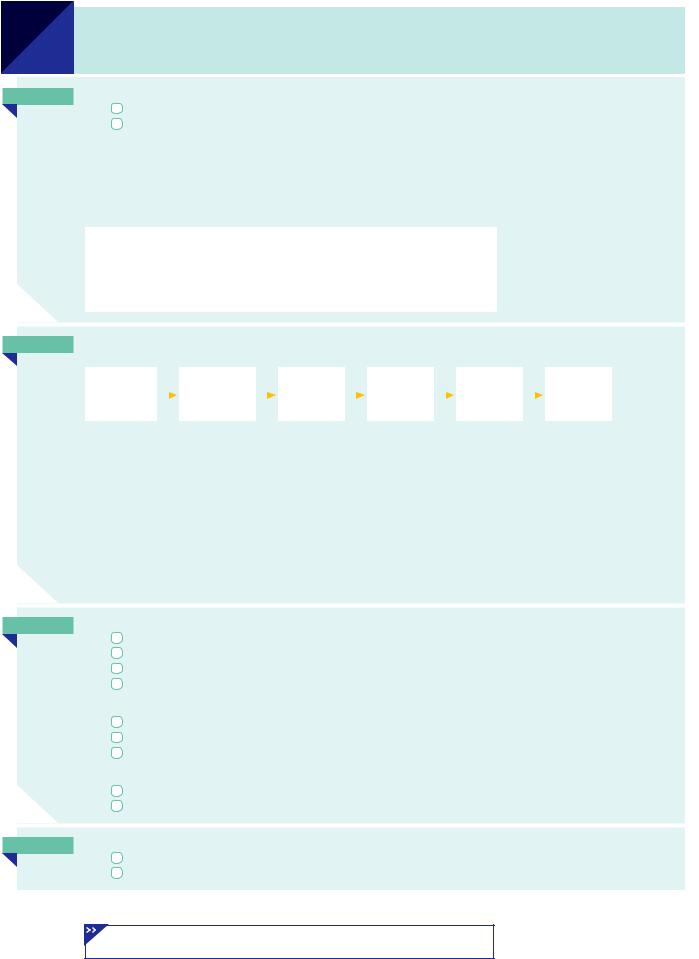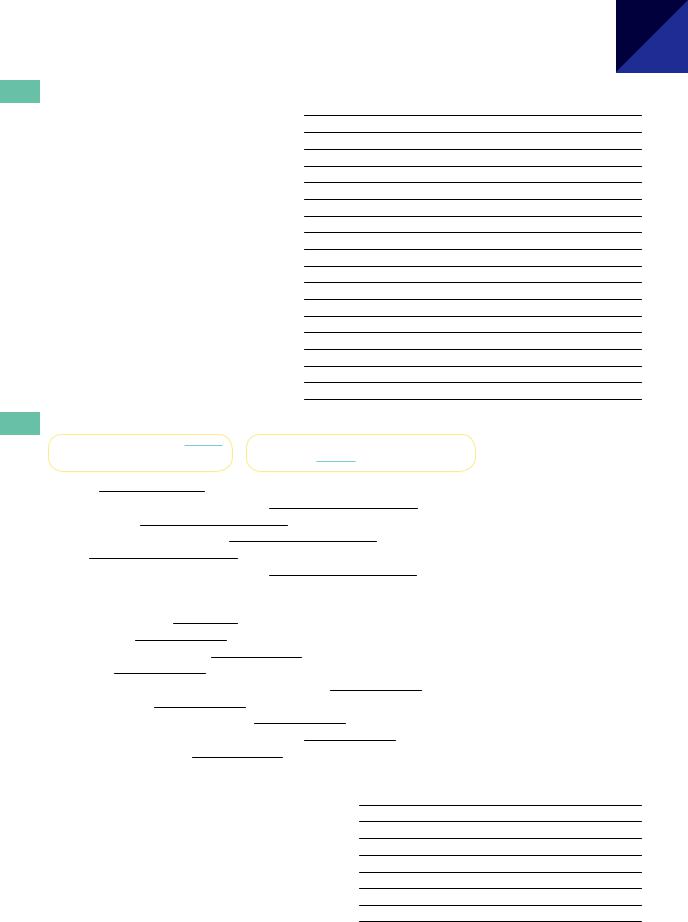
- •Contents
- •Thanks
- •To the student
- •To the teacher
- •3 Present continuous and present simple 1 (I am doing and I do)
- •10 Present perfect continuous and simple (I have been doing and I have done)
- •11 how long have you (been) … ?
- •12 for and since when … ? and how long … ?
- •13 Present perfect and past 1 (I have done and I did)
- •14 Present perfect and past 2 (I have done and I did)
- •15 Past perfect (I had done)
- •16 Past perfect continuous (I had been doing)
- •17 have and have got
- •18 used to (do)
- •19 Present tenses (I am doing / I do) for the future
- •20 I’m going to (do)
- •21 will and shall 1
- •22 will and shall 2
- •23 I will and I’m going to
- •24 will be doing and will have done
- •26 can, could and (be) able to
- •27 could (do) and could have (done)
- •28 must and can’t
- •29 may and might 1
- •30 may and might 2
- •31 have to and must
- •32 must mustn’t needn’t
- •33 should 1
- •34 should 2
- •35 I’d better … it’s time …
- •36 would
- •39 if I knew … I wish I knew …
- •40 if I had known … I wish I had known …
- •41 wish
- •42 Passive 1 (is done / was done)
- •43 Passive 2 (be done / been done / being done)
- •44 Passive 3
- •45 it is said that … he is said to … he is supposed to …
- •46 have something done
- •47 Reported speech 1 (he said that …)
- •48 Reported speech 2
- •49 Questions 1
- •52 Question tags (do you? isn’t it? etc.)
- •53 Verb + -ing (enjoy doing / stop doing etc.)
- •54 Verb + to … (decide to … / forget to … etc.)
- •55 Verb (+ object) + to … (I want you to …)
- •56 Verb + -ing or to … 1 (remember, regret etc.)
- •57 Verb + -ing or to … 2 (try, need, help)
- •58 Verb + -ing or to … 3 (like / would like etc.)
- •59 prefer and would rather
- •60 Preposition (in/for/about etc.) + -ing
- •61 be/get used to … (I’m used to …)
- •63 there’s no point in -ing, it’s worth -ing etc.
- •64 to … , for … and so that …
- •65 Adjective + to …
- •66 to … (afraid to do) and preposition + -ing (afraid of -ing)
- •67 see somebody do and see somebody doing
- •68 -ing clauses (He hurt his knee playing football.)
- •69 Countable and uncountable 1
- •70 Countable and uncountable 2
- •71 Countable nouns with a/an and some
- •74 the 2 (school / the school etc.)
- •75 the 3 (children / the children)
- •77 Names with and without the 1
- •78 Names with and without the 2
- •79 Singular and plural
- •80 Noun + noun (a bus driver / a headache)
- •81 -’s (your sister’s name) and of … (the name of the book)
- •82 myself/yourself/themselves etc.
- •83 a friend of mine my own house on my own / by myself
- •84 there … and it …
- •85 some and any
- •87 much, many, little, few, a lot, plenty
- •90 all every whole
- •91 each and every
- •92 Relative clauses 1: clauses with who/that/which
- •94 Relative clauses 3: whose/whom/where
- •95 Relative clauses 4: extra information clauses (1)
- •96 Relative clauses 5: extra information clauses (2)
- •97 -ing and -ed clauses (the woman talking to Tom, the boy injured in the accident)
- •98 Adjectives ending in -ing and -ed (boring/bored etc.)
- •99 Adjectives: a nice new house, you look tired
- •100 Adjectives and adverbs 1 (quick/quickly)
- •102 so and such
- •104 quite, pretty, rather and fairly
- •105 Comparative 1 (cheaper, more expensive etc.)
- •106 Comparative 2 (much better / any better etc.)
- •107 Comparative 3 (as … as / than)
- •108 Superlative (the longest / the most enjoyable etc.)
- •109 Word order 1: verb + object; place and time
- •110 Word order 2: adverbs with the verb
- •111 still any more yet already
- •112 even
- •114 in case
- •116 as (as I walked … / as I was … etc.)
- •117 like and as
- •119 during for while
- •121 at/on/in (time)
- •122 on time and in time at the end and in the end
- •123 in/at/on (position) 1
- •124 in/at/on (position) 2
- •125 in/at/on (position) 3
- •126 to, at, in and into
- •127 in/on/at (other uses)
- •129 Noun + preposition (reason for, cause of etc.)
- •130 Adjective + preposition 1
- •131 Adjective + preposition 2
- •132 Verb + preposition 1 to and at
- •134 Verb + preposition 3 about and of
- •135 Verb + preposition 4 of/for/from/on
- •136 Verb + preposition 5 in/into/with/to/on
- •137 Phrasal verbs 1 Introduction
- •138 Phrasal verbs 2 in/out
- •139 Phrasal verbs 3 out
- •142 Phrasal verbs 6 up/down
- •143 Phrasal verbs 7 up (1)
- •144 Phrasal verbs 8 up (2)
- •145 Phrasal verbs 9 away/back
- •Additional exercises
- •Study guide
- •Key to Exercises
- •Key to Additional exercises (see page 302)
- •Key to Study guide
- •Index

Unit
98 Adjectives ending in -ing and -ed (boring/bored etc.)
AMany adjectives end in -ing and -ed, for example: boring and bored.
Study this example situation:
bored
boring 
Jane has been doing the same job for a very long time. Every day she does exactly the same thing again and again. She doesn’t enjoy her job any more and would like to do something dif erent.
Jane’s job is boring.
Jane is bored with her job.
Somebody is bored or gets bored if something (or somebody else) is boring. If something is boring, you get bored with it.
So:
Jane is bored because her job is boring.
Jane’s job is boring, so Jane is bored. (not Jane is boring)
If a person is boring, this means that they make other people bored: Paul always talks about the same things. He’s really boring.
BCompare adjectives ending in -ing and -ed:
|
boring |
|
|
|
interesting |
|
|
|
My job is |
|
|
tiring |
||
|
|
satisfying |
|
|
|
|
|
|
|
depressing (etc.) |
|
In these examples, the -ing adjective tells you about the job
I’m bored with my job.
I’m not interested in my job any more. I get very tired doing my job.
I’m not satisfied with my job.
My job makes me depressed. (etc.)
In these examples, the -ed adjective tells you how somebody feels (about the job).
Compare these examples:
|
|
|
interesting |
|
interested |
Julia thinks politics is interesting. |
|
Julia is interested in politics. |
|
|
(not interesting in politics) |
Did you meet anyone interesting at |
|
Are you interested in buying a car? |
the party? |
|
I’m trying to sell mine. |
surprising |
|
surprised |
It was surprising that he passed the |
|
Everybody was surprised that he passed |
exam. |
|
the exam. |
disappointing |
|
disappointed |
The movie was disappointing. |
|
We were disappointed with the movie. |
We expected it to be better. |
|
We expected it to be better. |
shocking |
|
shocked |
The news was shocking. |
|
I was shocked when I heard the news. |
|
|
|
|
|
|
196

Exercises
98.1 Complete the sentences for each situation. Use the word in brackets + -ing or -ed.
1 |
The movie wasn’t as good as we had expected. (disappoint…) |
||
|
a |
The movie was disappointing . |
|
|
b We were disappointed with the movie. |
||
2 |
Donna teaches young children. It’s a very hard job, but she enjoys it. (exhaust…) |
||
|
a She enjoys her job, but it’s oten |
. |
|
|
b At the end of a day’s work, she is oten |
. |
|
3 |
It’s been raining all day. I hate this weather. (depress…) |
||
|
a |
This weather is |
. |
|
b |
This weather makes me |
. |
|
c |
It’s silly to get |
because of the weather. |
4 |
Clare is going to Mexico next month. She’s never been there before. (excit…) |
||
|
a It will be an |
experience for her. |
|
|
b Going to new places is always |
. |
|
|
c |
She is really |
about going to Mexico. |
98.2 Choose the correct word.
1I was disappointing / disappointed with the movie. I had expected it to be better. (disappointed is correct)
2 I’m not particularly interesting / interested in football.
3 The new project sounds exciting / excited. I’m looking forward to working on it. 4 It can be embarrassing / embarrassed when you have to ask people for money. 5 Do you easily get embarrassing / embarrassed?
6 I’d never expected to get the job. I was amazing / amazed when I was ofered it.
7 She’s learnt very fast. She’s made amazing / amazed progress. 8 I didn’t find the situation funny. I was not amusing / amused.
9 I’m interesting / interested in joining the club. How much does it cost?
10It was a really terrifying / terrified experience. Everybody was very shocking / shocked.
11Why do you always look so boring / bored? Is your life really so boring / bored?
12He’s one of the most boring / bored people I’ve ever met. He never stops talking and he never says anything interesting / interested.
98.3Complete each sentence using a word from the box.
amusing/amused |
annoying/annoyed |
boring/bored |
|
confusing/confused |
disgusting/disgusted |
exciting/excited |
|
exhausting/exhausted |
interesting/interested |
surprising |
/surprised |
1 |
You work very hard. It’s not surprising |
that you’re always tired. |
|
2 |
Some people get |
very easily. They always need something new. |
|
3 |
The teacher’s explanation was |
|
. Nobody understood it. |
4 |
The kitchen hadn’t been cleaned for ages. It was really |
. |
|
5 |
I don’t go to art galleries very oten. I’m not very |
in art. |
|
6 |
There’s no need to get |
just because I’m a few minutes late. |
|
7 |
The lecture was |
. I fell asleep. |
|
8 |
I’ve been working very hard all day and now I’m |
. |
|
9 |
I’m starting a new job next week. I’m very |
|
about it. |
10 |
Steve is good at telling funny stories. He can be very |
. |
|
11 |
Helen is a very |
person. She knows a lot, she’s travelled a lot and she’s |
|
|
done lots of diferent things. |
|
|
Unit
98
197

Unit
99 Adjectives: a nice new house, you look tired
ASometimes we use two or more adjectives together:
My brother lives in a nice new house.
In the kitchen there was a beautiful large round wooden table.
Adjectives like new/large/round/wooden are fact adjectives. They give us information about age, size, colour etc.
Adjectives like nice/beautiful are opinion adjectives. They tell us what the speaker thinks of something or somebody.
Opinion adjectives usually go before fact adjectives.
|
opinion |
fact |
|
a |
nice |
long |
summer holiday |
an |
interesting |
young |
man |
|
delicious |
hot |
vegetable soup |
a |
beautiful |
large round wooden |
table |
|
|
|
|
BSometimes we use two or more fact adjectives together. Usually (not always) we put fact adjectives
in this order: |
|
|
|
|
|
|
|
|
|
|
|
|
|
|
|
|
|
|
|
|
|
|
|
|
|
|
|
|
|
|
|
1 |
|
|
2 |
|
|
3 |
|
|
4 |
|
|
5 |
|
|
|
|
|
|
|
what |
|
|
where |
|
|
what is it |
|
|
NOUN |
||
how big? |
|
|
how old? |
|
|
|
|
|
|
|
|
||||
|
|
|
|
colour? |
|
|
from? |
|
|
made of? |
|
|
|
||
|
|
|
|
|
|
|
|
|
|
|
|
|
|||
|
|
|
|
|
|
|
|
|
|
|
|
|
|
|
|
a tall young man (1 → 2) big blue eyes (1 → 3)
a small black plastic bag (1 → 3 → 5)
a large wooden table (1 → 5) an old Russian song (2 → 4)
an old white cotton shirt (2 → 3 → 5)
Adjectives of size and length (big/small/tall/short/long etc.) usually go before adjectives of shape and width (round/fat/thin/slim/wide etc.):
a large round table a tall thin girl a long narrow street
When there are two or more colour adjectives, we use and:
a black and white dress a red, white and green flag This does not usually happen with other adjectives before a noun:
a long black dress (not a long and black dress)
CWe use adjectives ater be/get/become/seem:
Be careful!
I’m tired and I’m getting hungry.
As the film went on, it became more and more boring.
Your friend seems very nice.
We also use adjectives to say how somebody/something looks, feels, sounds, tastes or smells:
You look tired. / I feel tired. / She sounds tired.
The dinner smells good. This tea tastes a bit strange.
But to say how somebody does something you must use an adverb (see Units 100–101):
Drive carefully! (not Drive careful)
Suzanne plays the piano very well. (not plays … very good)
DWe say ‘the first two days’, ‘the next few weeks’, ‘the last ten minutes’ etc. :
I didn’t enjoy the first two days of the course. (not the two first days)
They’ll be away for the next few weeks. (not the few next weeks)
|
Adverbs Units 100–101 Comparative (cheaper etc.) Units 105–107 |
198 |
Superlative (cheapest etc.) Unit 108 |

Exercises
99.1 Put the adjectives in brackets in the correct position.
1 |
a beautiful table (wooden / round) |
a beautiful round wooden table |
2 |
an unusual ring (gold) |
|
3 |
an old house (beautiful) |
|
4 |
red gloves (leather) |
|
5 |
an American film (old) |
|
6 |
pink flowers (tiny) |
|
7 |
a long face (thin) |
|
8 |
big clouds (black) |
|
9 |
a sunny day (lovely) |
|
10an ugly dress (yellow)
11a wide avenue (long)
12important ideas (new)
13a new sweater (green / nice)
14a metal box (black / small)
15long hair (black / beautiful)
16an old painting (interesting / French)
17a large umbrella (red / yellow)
18a big cat (black / white / fat)
99.2Complete each sentence with a verb (in the correct form) and an adjective from the boxes.
|
|
feel |
look |
seem |
awful |
nervous |
interesting |
|
|
smell |
sound |
taste |
nice |
upset |
wet |
1 |
Helen |
seemed upset this morning. Do you know what was wrong? |
|||||
2 |
I can’t eat this. I’ve just tried it and it |
|
. |
||||
3 |
It’s normal to |
|
before an exam or an interview. |
||||
4 |
What beautiful flowers! They |
|
|
too. |
|||
5 |
You |
|
|
. Have you been out in the rain? |
|||
6 |
James told me about his new job. It |
|
– much better than his old job. |
||||
|
|
|
|
||||
99.3 |
Put in the correct word. |
|
|
|
|||
1 |
This tea tastes a bit |
strange |
. (strange / strangely) |
|
|||
2 |
I usually feel |
|
when the sun is shining. (happy / happily) |
||||
3 |
The children were playing |
in the garden. (happy / happily) |
|||||
4 |
You look |
! Are you all right? |
(terrible / terribly) |
||||
5 |
There’s no point in doing a job if you don’t do it |
. (proper / properly) |
|||||
6 |
The soup tastes |
|
. Can you give me the recipe? (good / well) |
||||
7 |
Please hurry up! You’re always so |
. (slow / slowly) |
|||||
8 |
A customer in the restaurant was behaving |
|
. (bad / badly) |
||||
9 |
The customer became |
when the manager asked him to leave. (violent / violently) |
|||||
|
|||||||
99.4 |
Write the following in another way using the first … / the next … / the last … . |
||||||
1 |
the first day and the second day of the course |
|
the first two days of the course |
||||
2 |
next week and the week ater |
|
|
the next two weeks |
|||
3 |
yesterday and the day before yesterday |
|
|
||||
4 |
the first week and the second week of May |
|
|
||||
5 |
tomorrow and a few days ater that |
|
|
||||
6 |
questions 1, 2 and 3 in the exam |
|
|
||||
7 |
next year and the year ater |
|
|
|
|||
8the last day of our holiday and the two days before that
Unit
99
Additional exercise 31 (page 320) |
199 |
